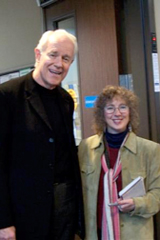By Miriam Raftery
 |
| Mike Farrell with officers of Eastlake-Bonita Democratic Club. |
February 17, 2009 (Bonita) — Mike Farrell and his co-stars
on the popular M*A*S*H TV show raised public awareness about the human costs
of war. But
what many fans don't realize is that in his private life, Farrell has much
in common with the character he portrayed, Dr. B.J. Hunnicutt. Traveling
to global hot spots from Central American jungles to war-torn African villages,
he has gained fame internationally as a humanitarian, working tireless to draw
attention to a wide range of human rights issues.
"There are responsibilities that come with citizenship," Farrell told East
County Magazine in an exclusive interview following a speech at the Bonita
Library On February 15, where Farrell signed copies of his poignant memoir, Just
Call Me Mike: A Journey To Actor and Activist, at an event sponsored
by the Eastlake-Bonita Democratic Club. During the interview,
he urged people to "get off the couch" and become involved in causes that they
care about. "If we leave it up to the other guy, often the result is that policies
or decisions are made that don't serve our interests," he observed.
In his book, Farrell makes clear that his zeal is rooted in both patriotism
and compassion. "For me, America is an ideal," he wrote, but noted that
our country has not always lived up to that idealistic vision. "America
may or may not be the last best hope of the world, but it is without question
the most powerful nation on the globe today, and it has at its core the most
humane and forward-looking principals known to mankind."
 Raised in a working class family in Hollywood, Farrell dreamed of stardom
Raised in a working class family in Hollywood, Farrell dreamed of stardom
but joined the Marine Corps instead, serving three months in San Diego. While
in the Marines, he made friends with an African-American soldier and encountered
racial prejudice, prompting him to become active in the civil rights movement. Later,
he protesting against the Vietnam War and supported efforts of Cesar Chavez
to help farm workers. An activist was born, but it wasn't until he achieved
stardom in M*A*S*H that he was able to use his fame as a launching pad to draw
broader attention to causes ranging from abolishing the death penalty to speaking
out against injustices in distant places--most recently, genocide in Darfur.
Asked his deepest source of inspiration, Farrell replied, "The birth of my
children." But he added, "Anytime I go anywhere and see people with courage
to stand up to adversity, it reinspires me. I took my kids (now 35 and
38) to El Salvador." He praised his family for being "supportive and
embracing" of his activism through the years.
During a trip to El Salvador amid a civil war, Farrell visited a hospital
where Salvadoran personnel had walked out, leaving a doctor with a critically
injured patient--and no surgical assistant. The doctor ordered Farrell to scrub,
don a surgical gown and gloves. "But I'm not a real doctor. All that
stuff we did on the show was fake," he protested. But ultimately, he
filled the role--even cutting a tendon as instructed to repair the patient's
hand--after the operating room lost electrical power during a guerilla attack.
Farrell testified before Congress about witnessing brutalities committed by
the Contras in El Salvador, including seeing a woman whose breasts had been
hacked off by soldiers after she asked about the fate of her son.
Discovering that refugees would be killed if they did not leave their homelands,
Farrell testified to Congress, asking that Central American and Guatemalan
immigrants be admitted as refugees of terror during the 1980s. When that
effort failed, he recalled, "I supported the sanctuary movement as am modern-day
underground railroad to find safe places for people." Today, he supports
rational immigration reforms, recalling words on the Statue of Liberty welcoming
"huddled masses yearning to be free." He criticizes anti-immigrant language
that is racist, opposes the border wall, and recalls "jubilation when the wall
between East and West Germany was taken down" after President Ronald Reagan
urged Russian premier Mikhail Gorbachev to remove the barrier.
His darkest moment came during a visit to the killing fields in Rwanda, a moment
chronicled in a journal on his website (www.mikefarrell.org). "I
spilled it out in the middle of the night after visiting a church where human
remains were all over the place," he recalled. In his journal, he wrote,
"Everything I believe was challenged by the infernal tableau in this place." He
concluded the journal entry by imploring, "If there is in man that divine spark,
it has here been crushed, spat upon, reviled, denied. Has it been extinguished?
Can it be? Will we allow it to be?"
As former co-chair of Human Rights Watch in California, Farrell has voiced
concerns over the alleged torture of prisoners by the U.S. in Guantanamo and
Abu Ghraib. Asked about possible war crimes committed by members of the
Bush administration, he replied, "If they were responsible, they deserve to
be exposed, charged and prosecuted."
Farrell has optimism that President Barack Obama will succeed in restoring
esteem for America in the world's view. He views the election of Obama
as America's response to "a great moral hunger," adding, "I met him once,
and he struck me as a very principled man whose life experience argues that
he understands and supports the principals and values to advance us toward
those which this country is aimed."
During his talk, he reflected on what he learned from M*A*S*H., a show
which expressed values in an unusual and penetrating way, he recalled. "The
show spoke to humanity, the value of life, the cost of war, and the inappropriateness
of war," he said. "The M*A*S*H message was `war hurts, blood is spilled,
and thumbing your nose at authority is a fundamental American value."
Sometimes, cast members thumbed noses at each other, playing practical jokes. He
described a gag pulled by David Ogen Stiers (aka Charles Winchester III), who
sent a dessert to cast members having lunch and convinced them it was compliments
of a visiting British director. Farrell countered by sending the tab
to Stiers, who not to be outdone, signed Gary Burghoff (Radar O'Reilly)'s name. Farrell
and O'Reilly had the last laugh, however, staging a mock fistfight on the set
later, until Stiers fessed up and promised never to pull another stunt. "He
lied," Farrell quipped.
He keeps in close touch with the M*A*S*H cast. Alan Alda now lives on
the East Coast, O'Reilly is an artist in Northern California and Stiers
lives in Oregon and conducts symphony orchestras. But Harry Morgan (Colonel
Potter), now 93, still lives in the Los Angeles area, as do Jamie Pharr (Colonel
Maxwell Klinger) and Loretta Swit (Margaret "Hot Lips" Houlihan). Swit
joined Farrell at a recent conference to speak out for abolishment of the death
penalty, a cause which Farrell has spear-headed nationally.
He notes the disproportionate number of African-Americans who have received
the death penalty and cites case after case in which DNA evidence cleared innocent
men on death row. From San Diego, he planned to travel to Montana, one
of several states with legislatures considering eliminating the death penalty.
Beyond exonerating the innocent and halting capital punishment, Farrell champions
reforming prison systems to emphasize rehabilitation where possible. He recalls
his work in a halfway house, where he learned a lesson that has stuck with
him through the years. "All human beings want three things: love,
attention and respect," he said. "I've tested this, been all over the
place--if people believe they are worthy of respect, then they open up to love. Our
nation has 2.3 million people behind bars--more than any other nation." Many
are illiterate or mental disabilities, he noted. "We treat them like
animals and when 93% are released, they behave like animals. How should we
be surprised about that?"
California's criminal justice budget now rivals its budget for public education,
Farrell observed, adding that the state has 150,000 prisoners in facilities
built to hold 50,000--overcrowding so severe that a judge last week ordered
California to set some prisoners free.
"We have failed," Farrell said of the system. "It costs more to keep
a kid in jail than to put him through college." He advocates funding Head Start
and programs to help kids get out of gangs, learn a trade, and get a job.
In a brand new book, Of Mule and Man, Farrell writes of a journey
across America, railing against Rush Limbaugh on the radio in areas where no
other viewpoints could be heard. Asked by ECM about his views
on media reform, Farrell responded, "What shock jocks fear most is reinstatement
of an equal time provision. Our public airways belong to us," he said, adding
that communications institutions should reflect the public interest--not just
a specific viewpoint.
He also criticized Hollywood. "The industry is failing," he acknowledged
in response to an audience member's question. "Many in the industry don't
want to accept that they are teaching values." Recalling an era when
racist and sexist stereotypes were prevalent in Hollywood, he observed that
the new stereotype is "might makes right." By contrast, he supports films
that are "life-affirming" and admits to cringing at many reality programs on
TV.
Overall, however, he retains a spirit of optimism for the future. "We need
to triumph over our fears," he said, adding that he looks forward to the prospect
under a new administration of "building a hopeful nation." He hopes for
peace and plans to continue speaking out for causes in which he believes.
 |
| Mike Farrell with ECM editor Miriam Raftery |
In his book, he described life as a journey "from the caves to the stars,"
noting that "there will always be those who choose to live in fear and try
to frighten, force or lure us back to the caves, but our future, our salvation,
the realization of our potential, is in the stars. And love will light
the way."
At the Bonita Library, Farrell shared this sentiment. "We all ask the
question at some point in our life, `What am I here for?" he reflected. He
once asked that question of two friends, a rabbi and a Catholic monk. "They
both gave the same answer: our purpose in life is to be more fully human."
The actor and activist summed up his philosophy of life this way. "It's about
caring enough to stick your neck out--even allowing yourself to be vulnerable. You
have to be willing to take that risk."










Recent comments